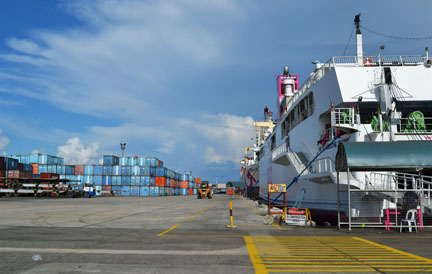-
The continuous increase in fuel prices is pushing up domestic shipping costs by 15% to 25%
-
Philippine Liner Shipping Association president Mark Matthew Parco said higher energy prices are affecting other costs, too, such as drydocking, spare parts and trucking
-
Parco recommends removal of fuel excise tax, provision of fuel subsidies, and substantial cut in government fees to reduce impact of higher fuel prices
Operating costs of domestic shipping lines are expected to go up by 15% to 25% due to the continuous increase in fuel prices, according to the Philippine Liner Shipping Association (PLSA).
PLSA president Mark Matthew Parco, during the fuel crisis ad hoc meeting on March 7 at the Lower House, said Brent crude has increased 62% from US$80 per barrel in January 2022 to around $124 to $130 per barrel as of March 7.
Parco noted that fuel accounts for 40% to 50% of a vessel’s operating cost, depending on the type of vessel.
“As you know shipping is deregulated. Different lines charge different things and we all come from different cost bases. Coming up with one surcharge is not as easy as it sounds,” Parco explained, adding that higher fuel prices have different effects on different shipping sectors.
He said higher energy prices also affect other costs such as drydocking, spare parts and trucking.
“Approximately, we expect shipping expenses to go up around 15% to 25%,” Parco said.
Parco, in an earlier interview with PortCalls, said domestic shipping lines have already started to impose bunker fuel surcharge since last year to cover additional fuel costs.
READ: Costlier crude forces local carriers to impose fuel surcharge
He said higher fuel prices are “a worry not just now but looking forward,” especially since the country is scheduled to implement the International Maritime Organization’s global 0.50% sulfur cap on marine fuel oil in the local shipping industry in 2025. The sulfur cap policy implemented in 2020 requires all ships in non-emission control area zones to limit the sulfur content of their fuels from 3.50% to 0.50%.
To reduce the impact of higher fuel prices, Parco echoed Philippine Inter-island Shipping Association (PISA) executive director Atty. Pedro Aguilar’s recommendation to remove fuel excise tax and provide fuel subsidies.
READ: Carriers seek fuel subsidy, suspension of excise tax, cut in gov’t fees
Aguilar at the ad hoc meeting acknowledged those two recommendations require legislative or executive action and may take time to process, but that another measure may be looked into: a substantial reduction of fees and charges, such port charges, imposed by regulating agencies.
Parco noted in particular the implementation last year of Philippine Ports Authority’s (PPA) uniform tariffs at Tier 3 ports bidded out under the agency’s new terminal management policy.
PISA in December had already asked the Lower House Committee on Transportation to review these rates, saying they are more than 100% higher than existing rates. The National Economic and Development Authority (NEDA) Regional Development Council (RDC) VIII, RDC IX, and stakeholders at Zamboanga and Tacloban ports, which began implementing the uniform rates after new cargo-handling operators took over last year, also requested a suspension of the uniform rates pending consultation.
READ: Domestic shipping group seeks House probe on higher PPA tariffs
Shipping lines have time and again said operating domestic ships in the country is costly due to the high cost of doing business, noting factors such as taxes, lack of economies of scale, and lack of equipment at some of the country’s ports.
Members of the fuel crisis ad hoc committee are planning to ask President Rodrigo Duterte to call for a special session to deliberate on House Bill 10438, which will suspend excise taxes on fuel.





